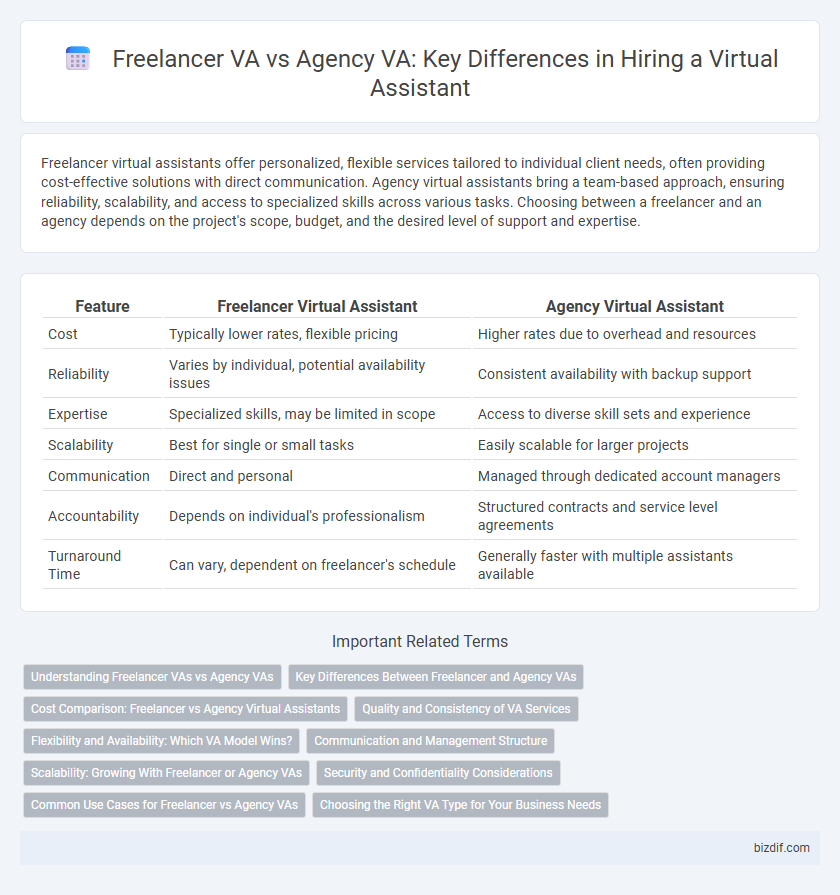Freelancer virtual assistants offer personalized, flexible services tailored to individual client needs, often providing cost-effective solutions with direct communication. Agency virtual assistants bring a team-based approach, ensuring reliability, scalability, and access to specialized skills across various tasks. Choosing between a freelancer and an agency depends on the project's scope, budget, and the desired level of support and expertise.
Table of Comparison
| Feature | Freelancer Virtual Assistant | Agency Virtual Assistant |
|---|---|---|
| Cost | Typically lower rates, flexible pricing | Higher rates due to overhead and resources |
| Reliability | Varies by individual, potential availability issues | Consistent availability with backup support |
| Expertise | Specialized skills, may be limited in scope | Access to diverse skill sets and experience |
| Scalability | Best for single or small tasks | Easily scalable for larger projects |
| Communication | Direct and personal | Managed through dedicated account managers |
| Accountability | Depends on individual's professionalism | Structured contracts and service level agreements |
| Turnaround Time | Can vary, dependent on freelancer's schedule | Generally faster with multiple assistants available |
Understanding Freelancer VAs vs Agency VAs
Freelancer virtual assistants typically offer personalized services and flexible pricing, catering to specific individual needs with direct communication and adaptability. Agency virtual assistants provide structured support through a team of professionals, ensuring consistent quality, diverse skill sets, and reliable scalability for complex projects. Understanding these differences helps businesses choose between tailored, cost-effective freelancing solutions and comprehensive, multi-expert agency assistance.
Key Differences Between Freelancer and Agency VAs
Freelancer virtual assistants offer personalized, flexible services often tailored to niche skills, while agency virtual assistants provide a broader range of expertise with team support and backup options. Agencies typically guarantee consistent availability and scalability, ensuring projects continue uninterrupted during individual absences. Freelancer VAs usually present cost-effective solutions with direct communication but lack the extensive resources and structured processes found in agency environments.
Cost Comparison: Freelancer vs Agency Virtual Assistants
Freelancer virtual assistants generally offer more cost-effective rates, often charging hourly fees between $10 to $30, making them ideal for budget-conscious businesses or short-term projects. Agency VAs, while typically costing $40 to $70 per hour, provide added benefits such as vetted professionals, diverse skill sets, and scalable support, justifying the higher fees for long-term or complex tasks. Businesses should weigh cost against reliability and scope when choosing between freelance and agency virtual assistants to optimize ROI.
Quality and Consistency of VA Services
Freelancer virtual assistants often provide personalized and flexible services, but their quality and consistency can vary significantly based on individual experience and workload management. Agency virtual assistants benefit from structured training programs and standardized processes, ensuring more reliable quality and consistent service delivery across diverse projects. Businesses seeking dependable and scalable support typically find agency VAs offer a more robust solution for long-term virtual assistance needs.
Flexibility and Availability: Which VA Model Wins?
Freelancer VAs offer unmatched flexibility with personalized schedules tailored to specific client needs, often providing availability across multiple time zones due to independent working hours. Agency VAs typically guarantee consistent availability and backup support through a team-based approach, ensuring minimal downtime and seamless service continuity. When prioritizing flexibility and 24/7 availability, freelancer VAs excel in adaptability, while agency VAs dominate in reliable, round-the-clock coverage.
Communication and Management Structure
Freelancer virtual assistants offer direct communication, allowing for personalized interactions and swift responses, enhancing task clarity and adaptability. Agency virtual assistants operate within a structured management hierarchy, providing consistent oversight, quality assurance, and scalability for complex projects. Efficient communication is often streamlined in freelancers through one-on-one channels, while agencies implement project management tools to coordinate multiple VAs and clients.
Scalability: Growing With Freelancer or Agency VAs
Freelancer virtual assistants offer flexible scalability by allowing businesses to hire specific skill sets as needed, facilitating gradual growth without long-term commitments. Agency VAs provide a broader talent pool and structured support, enabling rapid scaling for larger projects or fluctuating workloads. Choosing between a freelancer or agency VA depends on the desired growth pace and the complexity of business demands.
Security and Confidentiality Considerations
Freelancer virtual assistants often pose higher security risks due to varying levels of adherence to confidentiality protocols and limited oversight compared to agency VAs. Agencies typically implement stringent security measures, including background checks, encrypted communication, and robust data protection policies to safeguard sensitive client information. Choosing an agency VA enhances confidentiality assurance through structured compliance frameworks and accountability mechanisms.
Common Use Cases for Freelancer vs Agency VAs
Freelancer virtual assistants excel in specialized tasks such as social media management, content creation, and customer support for small businesses or solo entrepreneurs seeking personalized attention. Agency virtual assistants offer scalable solutions ideal for larger projects, including comprehensive administrative support, multi-channel marketing campaigns, and technical help across diverse business functions. Businesses often choose freelancers for cost-effective, flexible services, while agencies provide structured, reliable teams for complex, ongoing operations.
Choosing the Right VA Type for Your Business Needs
Freelancer virtual assistants offer personalized, flexible support ideal for small businesses or specialized tasks, while agency VAs provide a scalable, reliable team solution suited for larger projects with diverse needs. Selecting the right VA type depends on factors such as project complexity, budget, and desired level of oversight. Evaluating your business goals and workflow requirements ensures optimal productivity and cost efficiency.
Freelancer VA vs Agency VA Infographic

 bizdif.com
bizdif.com